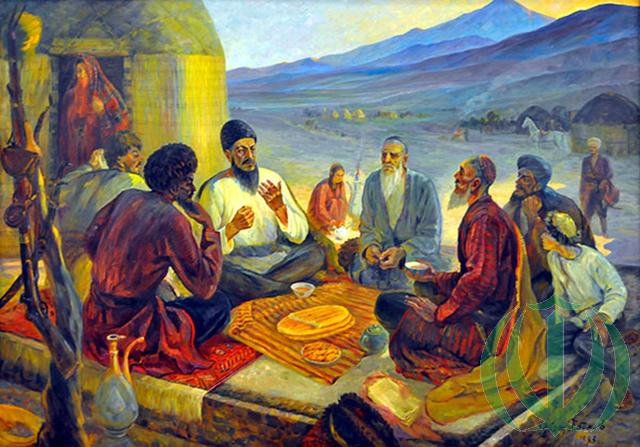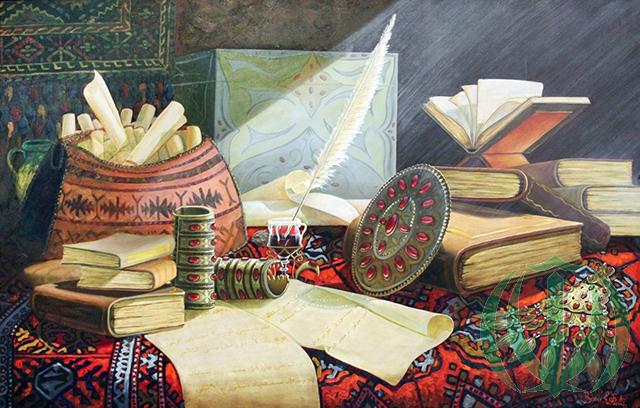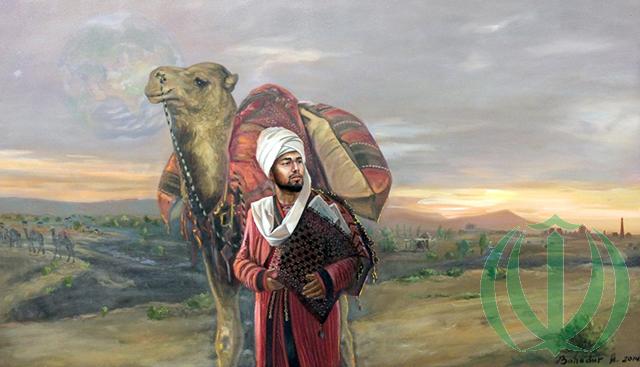Часть 1.
От Каспия на западе и до реки Аму на востоке, от Хорезма на севере и до Хорасана на юге тянутся великие степи, пустыни и горы, где многие века живут многочисленные племена туркменов. Во второй половине 18 века не было здесь человека, более известного и уважаемого, чем поэт Махтумкули. Его стихи как птицы разлетались во все туркменские края, становясь песнями. И на любом празднике эти песни пели бахши – народные музыканты и певцы. А уж если сам поэт посещал праздник, то не было гостя желаннее и знатнее. Даже сам эмир Хивы лично приглашал поэта на свои торжества.
Но не влекли Махтумкули дворцы и богатство. Родные просторы и их обитатели – простые пастухи и земледельцы – наполняли мудростью и содержанием его стихи и питали творческие силы поэта. Впрочем, были и исключения…
… Эту легенду я услышал более полувека назад. От мудрой женщины и замечательного искусствоведа – Галины Анатольевны Пугаченковой…

… В одной из областей в предгорьях Копет-Дага жил очень богатый правитель. Многие тысячи верблюдов и коней паслись на его землях, а овцам – не было счёта. Прекрасные ковры его мастериц везли и на север – в холодные края белого царя, и на юг – во дворцы индийских раджей. Но не только богатством славился правитель. Был он весьма справедлив – большая в те времена редкость…
На свадьбу сына этого правителя и приехал однажды Махтумкули. Весть об этом со скоростью доброго скакуна разнеслась во все стороны. Семьями, все кто только мог, шли или ехали сюда: ведь сам Махтумкули здесь!
Свадебные торжества шли уже несколько дней. В последний их день, рано-рано утром Махтумкули вышел в степь. Один. Ведь в такой час, когда светлело осеннее небо и гасли уже холодные осенние звёзды, рождались самые проникновенные строки его стихов.
Вдруг из-за крайней и очень бедной юрты к нему в ноги бросились юноша и девушка. Плечи девушки сотрясали рыдания, а юноша срывающимся голосом рассказал: они с детства любят друг друга, но отец девушки – приближённый правителя и весьма богат, а он – сын бедной вдовы, поэтому у них один выход – умереть вместе – нет им жизни друг без друга…
Махтумкули, любимую которого когда-то отдали за другого, оба родных брата которого были убиты в плену, а сыновья – два таких дорогих мальчика умерли ещё в детстве, как никто другой понял влюблённых. Он попросил их пока не совершать этот роковой шаг…
Вечером Махтумкули читал гостям свои новые стихи.
Сотни людей, слушали, затаив дыхание. Лишь слёзы текли по щекам стариков, вспоминающих свою далёкую молодость, лишь лица девушек покрывались нежным румянцем от ожидания своего будущего счастья, лишь мускулы мужчин наливались силой для совершения подвигов. Счастливы люди, имея такого правителя, – закончил поэт.
Вставший хозяин обнял его и объявил всем, что отныне Махтумкули его любимый брат и воля его брата – это его воля. Крики восторга и радости заглушили его последние слова…
Махтумкули поднял руку, желая говорить вновь. И снова звенящая тишина – лишь где-то в степи прокричала ночная птица.
– Я хочу приехать к вам ещё раз. Через год. На свадьбу, – сказал он. И назвал имена девушки и её отца, имена юноши и его матери. Поражённые гости молчали, зная, что это невиданная честь для племени – только у эмира далёкой Хивы Махтумкули читал стихи дважды…
Утром в юрту поэта вошёл правитель – слуга нёс на подносе тяжёлый кисет с деньгами. Они вышли. За юртой стояли верблюды с поклажей и оседланные кони – тоже подарок правителя названному брату. А к юрте подходили седобородые старики, среди которых был и отец девушки. Поклонившись, они сказали, что свадьба состоится ровно через год. Люди будут счасливы видеть среди гостей Махтумкули.
Уехал Махтумкули без подарков брата – все их он оставил матери жениха…
… Прошёл год. Махтумкули вновь ехал на свадьбу. На границе области поэта встретил отряд лихих джигитов. Возглавлял этот отряд сам жених…
(Продолжение следует).

Makhtumkuli
Part 1.
From the Caspian in the west and to the Amu River in the east, from Khorezm in the north and to Khorasan in the south, great steppes, deserts and mountains stretch, where numerous tribes of Turkmen live for many centuries. In the second half of the 18th century there was no person more famous and respected than the poet Makhtumkuli. His poems scattered like birds to all Turkmen lands, becoming songs. And at any holiday these songs were sung by Bakhshi – folk musicians and singers. And if the poet himself attended the holiday, then there was no guest more desirable and noble. Even the emir of Khiva personally invited the poet to his celebrations.
But Makhtumkuli did not attract palaces and wealth. Native open spaces and their inhabitants – simple shepherds and farmers – filled poetry with wisdom and content and nourished the poet’s creative powers. However, there were exceptions …
… I heard this legend more than half a century ago. From a wise woman and a wonderful art critic – Galina Anatolyevna Pugachenkova …
… In one of the regions in the foothills of Kopet-Dag there lived a very rich ruler. Many thousands of camels and horses grazed on his lands, and the sheep did not have an account. The beautiful carpets of his craftswomen carried both to the north – to the cold lands of the white king, and to the south – to the palaces of the Indian Rajas. But not only the ruler was famous for wealth. He was very fair – a rarity in those days …
Makhtumkuli once arrived at the wedding of the son of this ruler. The news of this with the speed of a good steed spread in all directions. Families, all who could, went or rode here: after all, Makhtumkuli himself is here!
Wedding celebrations have been going on for several days. On their last day, early in the morning, Makhtumkuli entered the steppe. One. Indeed, at such an hour, when the autumn sky brightened and the cold autumn stars were already fading, the most soulful lines of his poems were born.
Suddenly, because of an extreme and very poor yurt, a young man and a girl rushed to his feet. The girl’s shoulders were shaken by sobs, and the boy said in a broken voice: they love each other since childhood, but the girl’s father is an approximate ruler and very rich, and he is the son of a poor widow, so they have one way out – to die together – they have no life without each other …
Makhtumkuli, whose beloved was once given for another, both siblings of which were killed in captivity, and sons – two such dear boys died in childhood, as no one else understood the lovers. He asked them not to take this fateful step yet …
In the evening, Makhtumkuli read his new poems to guests.
Hundreds of people listened with bated breath. Only tears flowed on the cheeks of old people, recalling their distant youth, only the girls’ faces were covered with a tender blush from the expectation of their future happiness, only the muscles of men poured strength to perform feats. People are happy having such a ruler, ”the poet finished.
The master who got up embraced him and announced to everyone that from now on Makhtumkuli his beloved brother and the will of his brother is his will. Shouts of delight and joy drowned out his last words …
Makhtumkuli raised his hand, wishing to speak again. And again the ringing silence – only somewhere in the steppe a night bird cried out.
“I want to come to you again.” In a year. At the wedding, ”he said. And he named the names of the girl and her father, the names of the boy and his mother. Amazed guests were silent, knowing that it was an unprecedented honor for the tribe – only at the emir of the distant Khiva Makhtumkuli read poetry twice …
In the morning, the ruler entered the poet’s yurt – the servant carried a heavy pouch with money on a tray. They went out. Behind the yurt there were camels with luggage and saddled horses – also a gift from the ruler to his brother named. And gray-bearded old men came to the yurt, among whom was the girl’s father. Bowing, they said that the wedding would take place exactly one year later. People will be happy to see Makhtumkuli among the guests.
Makhtumkuli left without his brother’s gifts – he left all of them to the groom’s mother …
… A year has passed. Makhtumkuli again went to the wedding. On the border of the region of the poet met a detachment of dashing Dzhigits. This unit was led by the groom himself …
(To be continued).



0 Comments